January 23, 2013
Edited by David Sanders
Specimen Days
January 23, 2013
1582 – John Barclay, Scottish satirist/Latin poet (Argenis), is born.
1639 – Francisco Maldonado da Silva Solis, Peruvian poet, burned at stake.
1648 – Francisco de Rojas Zorrilla, Spanish poet (Del Rey Abajo), dies at 40.
1761 – Friedrich von Matthison, German poet (Adelaide), is born.
1878 – Oton Zupancic, Slovenian poet (Zimzelen pod Snegom), is born.
1893 – Jose Zorrilla y Moral, Spanish poet (Granada), dies at 75.
1905 – Konstanty I Galczynski, Polish poet (Zielona Ges), is born.
1908 – Hubert Nicholson, poet/novelist, is born.
1930 – Derek Walcott, St Lucia, poet/writer (Omeros, Nobel 1992), is born.
1944 – Viktor Gusev, Russian poet (b. 1909), dies.
1984 – Mu’in Bseiso, Palestinian poet (b. 1926), dies.
1996 – Norman MacCaig, poet, dies at 85.
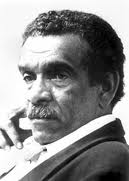 Take down the love letters from the bookshelf,
Take down the love letters from the bookshelf,
the photographs, the desperate notes,
peel your own image from the mirror.
Sit. Feast on your life.
—from “Love after Love,” by Derek Walcott, born 1930
Poetry In The News
Emily Dickinson Scrawled Her Poems on These Tiny Scraps of Paper

These scraps of paper, carrying shards of poems and prose, give us glimpses of Emily Dickinson’s creative process during the latter years of her life. Amherst College holds many of what Dickinson scholars call “fragments.” (Their collection, which contains of letters and manuscript drafts alongside these fragments, has recently been digitized and is fully accessible to the public. Log in as “Guest.”) Read more at Slate.
Poetry for Presidents
Midday on Monday, the relatively unknown Cuban-American poet Richard Blanco will be the fifth poet to read at the inauguration of an American President, joining the company of Robert Frost (Kennedy, 1961), Maya Angelou (Clinton, 1993), Miller Williams (Clinton, 1997), and Elizabeth Alexander (Obama, 2009). Blanco will read an original composition, just as Angelou, Williams, and Alexander have done before him. Frost also wrote a new poem for the occasion, but he was eighty-six at the time, and, famously, the frigid, blustery weather and glaring sun in Washington that day made reading difficult. So he abandoned the new poem and recited one that Kennedy had requested, “The Gift Outright,” from memory. Read more at the New Yorker.
Rare Collection of Robert Frost Materials Emerges, Could Shed Light on Poet’s Religious Views
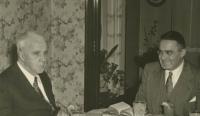
A rare collection of letters, audio files, photographs and other materials that could illuminate the personal beliefs of Robert Frost is being made available to the public for the first time. The collection chronicles a 24-year friendship between the beloved American poet and Victor Reichert, a Cincinnati rabbi who summered with Frost in Vermont. It was kept in the Buffalo home of the rabbi’s son, Jonathan Reichert, University at Buffalo professor emeritus of physics. Read more at the University of Buffalo News Center.
Previously Unknown Sandburg Poem Focuses on Power of the Gun
In an apparently unpublished and previously unknown poem, Carl Sandburg addressed the topic of guns. Titled “A Revolver,” the short piece was discovered last week among Sandburg’s archives, housed in the Rare Book and Manuscript Library of the University of Illinois at Urbana-Champaign. The poem was found last week by Ernie Gullerud, a retired U. of I. professor who has volunteered at the library every Thursday for more than seven years, helping to index the more than 4 tons of material that make up the Sandburg collection. Read more at the University of Illinois News Bureau.
World Poetry
U.K. Asks Students To Learn Poetry ‘By Heart,’ Not By Rote
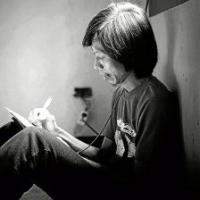
A poet-activist detained for more than a year in Samar for possession of explosives was temporarily freed by the court to undergo medical treatment at the National Kidney Center in Manila. The regional trial court (RTC) in Gandara, Samar finally granted a motion for a medical checkup filed by lawyers of former University of the Philippines student Ericson Acosta in July 2012, after the detainee displayed symptoms of serious renal problems. Read more at the Philippine Daily Inquirer.
Bob Dylan Invited to Perform at Poet’s 100th Birthday Celebration
Bob Dylan has been asked to headline a festival to mark the 100th birthday of his namesake Dylan Thomas in the poet's native Wales. Read more at MSN.
New Books
Southern Poetry Anthology V: Georgia edited by William Wright and Paul Ruffin
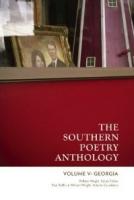
[Paperback] Texas Review Press, 288 pp., $26.95
Edited by William Wright and Paul Ruffin, The Southern Poetry Anthology, Volume V: Georgia brings together over one hundred of Georgia’s poets, including David Bottoms, Natasha Trethewey, Leon Stokesbury, Thomas Lux, Kathryn Stripling Byer, Alice Friman, Judson Mitcham, and Stephen Corey, as well as myriad other luminous voices. The volume marks the fifth of the series Art & Literature has called “one of the most ambitious projects in contemporary Southern letters.”
Go Giants by Nick Laird
[Paperback] Faber & Faber, 80 pp., $13.97
In Go Giants, his third and most ambitious volume, Nick Laird's poetry travels yet further afield, connecting the shores of his native Northern Ireland with those of the American east coast where he spends increasing time. The result is an almost trans-Atlantic fusion, an inventive melding of Ulster lyricism with proto-Beat rhythms and phrase. The author's gaze appears longer and more penetrative than before, casting back across the ocean to find a fresh perspective on older questions while vividly capturing the vibrancy of the new. Nick Laird writes with wit and candour, with polemic and persuasion, with no subject seemingly too large or too small: weapons of mass destruction, sectarian violence, religious faith, Jonah and the Whale, marriage, fatherhood, a daughter.
Collected Poems by Peter McDonald
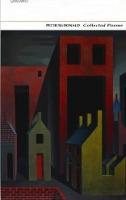
[Paperback] Carcanet Press Ltd., 280 pp., $29.95
A collection of five books of poems by Northern Irish poet Peter McDonald, this book ranges wildly across subjects and forms and combines intense emotional perception with a historical and personal imagination. Ambitious and original, it meditates on place, belonging, loss, and love while exploring the haunting persistence of memories and the acts of remembrance that preserve and shape them. The classical world inspired many of the works herein and his lyrical narrative style has established him as one of the important writers of contemporary Northern Irish poetry.
The Adventures of Ibn Opcit: Two Volume Box Set by John Gorman Barr
[Paperback] Red Hen Press, 280 pp., $24.95
The Adventures of Ibn Opcit is a two-volume work by John Barr, first president of The Poetry Foundation. Grace, the first volume of this mock epic, is the master song of Ibn Opcit, a Caribbean gardener/poet condemned to die by torture. In a series of jailhouse monologues we hear him descant on justice, on creation, on America, on death and on life after death. In volume two, Opcit at Large, the poet pushes back on his oppressors in three adventures. Like Virgil in the Inferno he visits the afterworld of reincarnation in “The Afterdammit;” he struggles to survive as poet laureate to Africa’s newest President for Life in “Opcit en Afrique;” he orbits earth as “The Last Cosmonaut” on the eve of the fall of the Soviet Union. He comes home with the dignity and strength of one who has survived and prevailed.
Recent Reviews
Maged Zaher’s Out-to-lunch Poem

by David L. Ulin
There’s a handmade quality to Maged Zaher’s third volume of poetry, Thank You for the Window Office (Ugly Duckling: 74 pp., $15 paper), and not just because of the rough-hewn beauty of the book itself. No, the work here — one long, impressionistic poem about … well, really, about everything — seems piped directly from the inside of the poet’s head as he lives and thinks his way through the moment, a moment defined by alienation, humor, politics and the indignities of a corporate culture that cares nothing for the soul. Read more at the LA Times.
Correspondences
Poetry Questions: Michael McClure

by Rebecca Foresman
Michael McClure began his career as a Beat poet in the midst of the San Francisco renaissance. In 1955, he took part in the legendary Six Gallery reading, along with Allen Ginsberg, Gary Snyder, Philip Lamantia, and Philip Whalen. McClure went on to become a central voice in the countercultural movement, collaborating prolifically with rock musicians and political activists. In addition to his poetry, McClure writes as a journalist, documentary filmmaker, playwright, novelist, and lyricist. McClure’s poem “Mephisto 20” is featured in this week’s issue. I spoke with him about the striking interplay between Thoreauvian transcendentalism and Old Testament fatalism in the poem. Read more at the New Yorker.
David Ferry’s Beautiful Thefts
by Dan Chiasson
Poetry is innately related to theft. The lyre was invented, the Greeks tell us, by Hermes, who then gave the instrument to Apollo as compensation for stealing cattle. One reason people’s aversion to poetry sometimes passes over into strong annoyance, or even resentment, is that poems steal our very language out from under us and return it malformed, misshapen, hardly recognizable. Poetry carries us to odd places, almost like the prank, allegedly popular a few years ago, in which somebody steals your garden gnome and sends you postcards of it from points spanning the globe—the Blarney Stone, the Pont-Neuf. Read more at the New Yorker.
A Conversation with B. K. Fischer

by Andrew Wessels
"The poem has to have, to make, some kind of appeal, to function as entreaty and enticement. I try the best I can to write evocatively, and to find and publish evocative writing, and what that means is a moving target. I’m not afraid of difficulty, and I’m also not afraid of clarity. Each poem, each project, each occasion for poems or book of poems, demands mystery and accessibility in different measure…" B. K. Fischer
Read more at the Offending Adam.
Broadsides
Golden Handcuffs
by Daniel Bosch
A dialogue on the poems of Frederick Seidel
Scene
Late morning. Faint sound of thunder and light rain falling on the roof, will fade to a stop in a few minutes. The modest home of Fidelis, a mile uptown from the Agora. Faux granite pilasters recede from downstage left and right. Piles of bound books and manuscripts, a low table, a chair or two. Torches on stanchions give Fidelis, wearing a clean white toga and seated on the floor at center, plenty of light to see scraps of paper arrayed on tiles in front of him, and a copy of Nice Weather flat on the floor at his side. Enter Skepticus, cautiously, his toga somewhat worse for wear and damp from rain. parting a curtain draped across a doorway furthest upstage center. Seeing Fidelis, Skepticus tiptoes downstage, deliberately, so as not to disturb his host, who is deeply involved, arranging and re-arranging the scraps. Skepticus passes slowly, unnoticed, downstage of Fidelis, then leans over Fidelis’ shoulder for a moment, to read the scraps and the cover of the book. Read more at Berfrois.
Sylvia Plath: The Idol, the Victim — and the Pioneer
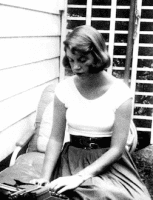
by Ruth Padel
Fifty years after her suicide in the bitter winter of 1963, Sylvia Plath survives as a legend as much as as a poet. Half a century on, it's time to drop the myth and focus again on the work. Read more at the Independent.
Drafts & Fragments
The Unofficial, Crowd-Sourced Inaugural Poem
Here at The Takeaway, we think poetry was built for the digital age, so we cooked up a crowd-sourced poetry project with noted poet Kwame Dawes. Last week, Dawes started our our crowd-sourced inaugural poem project with these lines: Say "nation." In the wake of quarrels, say "hope." And you took it from there, sending us hundreds of suggestions for lines to be included in the poem via our website, Facebook, Twitter, text, and phone. Follow the links to see who wrote the line.
Pentametron Is A Twitter Poet That Gives Bots Some Literary Cred
by Ingrid Lunden
I use Twitter for work. But because work is something I seem to do quite a lot, my use of Twitter has ranged over time to include a lot of other content. One of my favorite discoveries in the last year has been Pentametron, a bot — represented by Shakespeare’s face framed by the classic Twitter egg – that seeks out public tweets written in iambic pentameter, which it then retweets in rhyming couplets.
Envoi: Editor’s Notes
Inauguration Poet Hopes “America Can Relate” to Poem
At age 44, Richard Blanco is not only the youngest person to ever write the official poem for the inauguration but also the first to be Hispanic and openly gay. While writing the poem, Blanco says he did not leave his house for days. Read more at the Washington Post.
Forever Young
The inaugural poet club is a pretty small group. As of Monday, it has five members. The newest member, Richard Blanco, is also, we are told in nearly every report of his appointment, the youngest. Given the fact that there have been only four before him it’s a little precious to say so. The truth is that only Miller Williams, who was the inaugural poet for Clinton’s second inaugural, and so is placed historically between Maya Angelou and Elizabeth Alexander, was not the youngest poet to read at the time of the inauguration. If we follow the reasoning of the argument of the press release, Robert Frost as the first was both the youngest and oldest, when compared to himself and since it's such a select group, why not? Angelou following Frost was his junior, so she became the youngest (or the younger); Williams, while a few years younger than Angelou, was older when he read then she was when she read. And Alexander was younger still, and so she became the youngest. And now Blanco is younger than Alexander was. So why is his being the youngest out of a set of five interesting? It's not. It's another way for the rest of the world to find something interesting about Blanco (something about which he has no influence or control), besides his being a poet. And so instead of being merely the inaugural poet, he becomes, among other things, "the youngest person to ever write the official poem for the inauguration." Would our appreciation of Miller Williams have been enhanced if he he had been labelled as the first inaugural poet to have a pop-star for a daughter or would we think differently of Elizabeth Alexander knowing she was the first inaugural poet who is the daughter of the former Secretary of the Army? Being tapped to be the inaugural poet should be plenty enough to be distinguished from all others. By the way, given the limitations of the assignment, Blanco's poem was one of the best ever.
—David Sanders